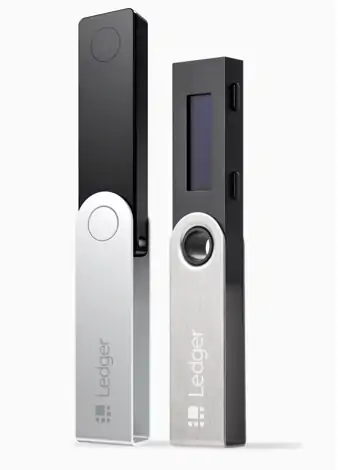Algorithmic trading (Binance / Bybit / OKX API key)

Securing your cryptos
Ledger ?
Ledger is a hardware wallet solution, i.e. a cryptocurrency wallet not connected to the Internet.
With this type of storage, you are master of your keys, and the funds kept are thus protected from the risks of theft by hacking or bankruptcy of your exchange (ex FTX ...), while remaining able to manage them daily.

The Wallets
Which Ledger to Choose?
Which Ledger to choose, Nano S Plus or Nano X?
Both are very similar, ideal for storing your NFT and tokens (more than 5500 tokens available).
The hardware being similar between the two Ledger, the main difference is the possibility to use Bluetooth on the Nano X instead of USB cable (it is therefore battery powered).
Some will see a weakness in the Bluetooth that could be hacked, but you would also have to unlock the key with your code, others will see a comfort of use, because no need to plug the USB cable at each use.
The Ledger Live application
On computer or mobile your Ledger will be coupled with the Legder Live application.
This application will guide you to configure your Ledger.
Once your Ledger is ready, the application will connect to your Ledger to drive your wallet:
- consultation of your funds
- deposits / withdrawals
- purchases / sales
- swap
- ...

Secure your crypto-currencies
Portfolio types
Beware, on the wallets made available by brokers such as Binance or FTX, the keys of the portfolio do not really belong to you, the broker is therefore master of your funds: not your keys, not your cryptos...
The"Hot Wallet
Hot wallets allow you to use your digital assets quickly and usually take the form of an application such as Metamask or Phantom. It is rare, but it happens, because these wallets are connected to the net, that they get hacked.
The "Cold Wallet
A so-called cold storage solution that allows you to keep your cryptocurrencies away from any direct access to the Internet.
And Ledger?
Ledger is a hardware wallet, it is part of the coldwallet solutions where a physical medium will keep your public and private keys. It will require a physical action from you to sign the transactions when sending a cryptocurrency for example.
Lost your Ledger? No worries, just get a new Ledger, enter your recovery phrase, and you're on your way.
Over the years
THE HISTORY OF LEDGER
The beginning
Ledger was created in 2014 by Eric Larchevêque and Thomas France create Ledger with the founders of two other startups: BTChip and ChronoCoin.
Ledger's goal is to secure crypto-currency holdings and transactions for individual users by designing digital physical wallets (hardware wallets).
Different products are marketed between 2014 and 2016 under the generic name "Ledger Nano" and only a limited number of crypto-currencies are supported, for example Bitcoin or even Ethereum.
The company will become the first cryptocurrency wallet to obtain the First Level Security Certification (CSPN) from the ANSSI.
The expansion
In March 2017, Ledger raised €7 million in a funding round led by Maif Avenir.
With a fundraising of $75 million in 2018, it ranks third among French startups that have raised the most funds.
At the same time, the company is investing ten million euros in the construction of a factory in Vierzon after having long relocated its production to China.
Bad pass
In the spring of 2019, Le Monde reports that positions are being cut in the Paris team. Les Echos claims, for its part, that nearly 10% of the total workforce is threatened, particularly in support functions, due to the collapse of the Bitcoin price (with the company's digital wallet sales halved in one year). But soon after, the company announced that it was once again recruiting.
Unicorn status
In June 2021, Ledger raises €380 million and is valued at $1.5 billion.
Members' opinions
[site_reviews_summary assigned_posts="post_id"]
[site_reviews assigned_posts="post_id" rating="2″ display="3″]
[site_reviews_form assigned_posts="post_id"]
On the front page!
Setting up your trading robot [By Paul Bourdeau].



